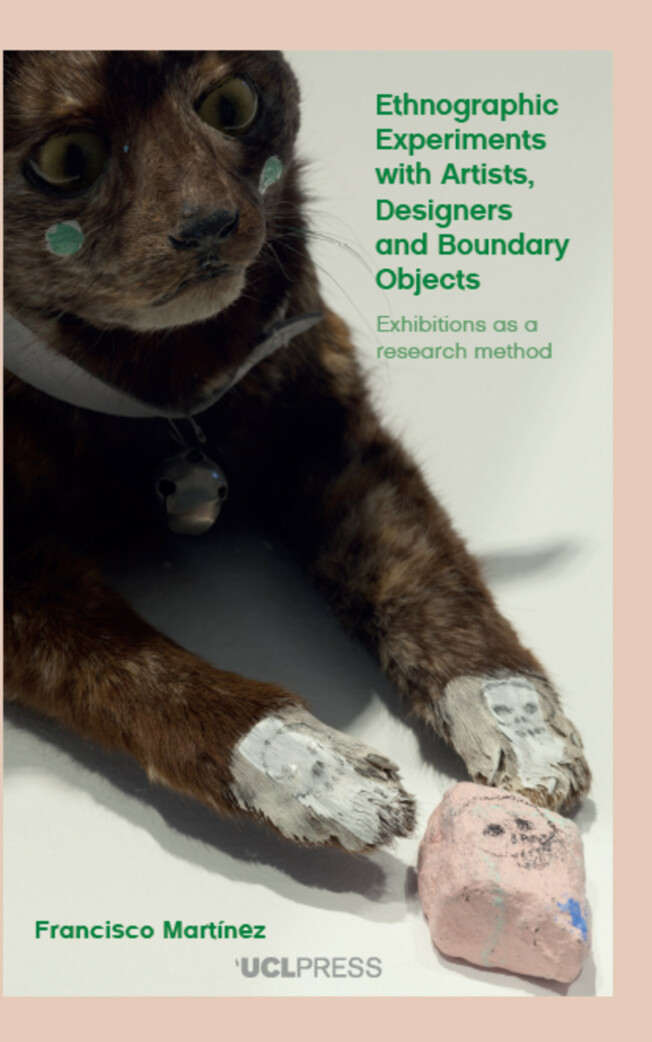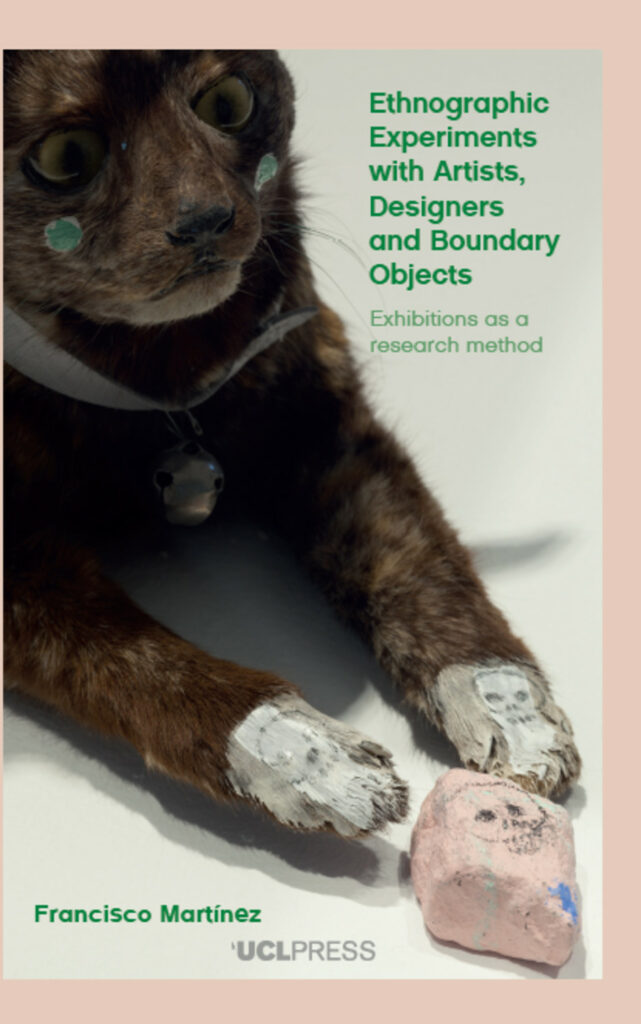
Ethnographic Experiments with Artists, Designers and Boundary Objects
Exhibitions as a research method
Francisco Martínez (Author)
Ethnographic Experiments with Artists, Designers and Boundary Objects is a lively investigation into ethnographic practice. Richly illustrated, it invites the reader to reflect on the skills of collaboration and experimentation in fieldwork and in gallery curation, thereby expanding our modes of knowledge production.
Francisco Martínez increases our understanding of the relationship between contemporary art, design and anthropology, imagining creative ways to engage with the contemporary world and developing research infrastructures across disciplines. He opens up a vast field of methodological explorations, providing a language to reconsider ethnography and objecthood while producing knowledge with people of different backgrounds.
At the heart of this study are the possibilities for transdisciplinary collaborations, the opportunity to use exhibitions as research devices, and the role of experimentation in the exhibition process. It is critical reading for researchers of Anthropology, Material Culture and Museum Studies, and for any reader with an interest in ethnographic methods.
Praise for Ethnographic Experiments with Artists, Designers and Boundary Objects
‘Martinez’s work contributes to experimental ethnography, which seeks to rethink and overcome subject-object relationships in field research, expanding the methodological boundaries of the discipline. [Ethnographic Experiments with Artists, Designers and Boundary Objects] will be of interest to anyone interested in curatorial experience, ethnography of transdisciplinary cooperation, experimental practices and methods, as well as collaboration with artists and designers.’
Anthropological Forum
List of figures
Acknowledgements
1 Epistemic generosity
2 Putting objects to work
3 Collaboratology
4 Master insights
5 A laboratory of objects
6 Permeable museums
7 Curating ethnographic research
Coda: the morning after
References
Index
DOI: 10.14324/111.9781800081086
Number of illustrations: 57
Publication date: 01 November 2021
PDF ISBN: 9781800081086
EPUB ISBN: 9781800081116
Hardback ISBN: 9781800081109
Paperback ISBN: 9781800081093
Francisco Martínez (Author) 
Francisco Martínez is an anthropologist dealing with contemporary issues of material culture through ethnographic experiments. In 2018, he was awarded with the Early Career Prize of the European Association of Social Anthropologists. Currently, he works as Associate Professor at Tallinn University and convenes the Collaboratory for Ethnographic Experimentation (EASA Network). Francisco has published two monographs: Ethnographic Experiments with Artists, Designers and Boundary Objects (UCL Press, 2021) and Remains of the Soviet Past in Estonia (UCL Press, 2018). He has edited several books including Peripheral Methodologies (Routledge, 2021), Politics of Recuperation in Post-Crisis Portugal (Bloomsbury, 2020) and Repair, Brokenness, Breakthrough (Berghahn, 2019). He has also curated different exhibitions including ‘Objects of Attention’ (Estonian Museum of Applied Art & Design, 2019) and ‘Life in Decline’ (Estonian Mining Museum, 2021).
‘Martinez’s work contributes to experimental ethnography, which seeks to rethink and overcome subject-object relationships in field research, expanding the methodological boundaries of the discipline. [Ethnographic Experiments with Artists, Designers and Boundary Objects] will be of interest to anyone interested in curatorial experience, ethnography of transdisciplinary cooperation, experimental practices and methods, as well as collaboration with artists and designers.’
Anthropological Forum
‘With Ethnographic Experiments, Martínez has curated scenarios for novel ethnographic relations. His approach to anthropology is capacious and creative, inviting future experiments for doing research differently. His writing easily moves across disciplinary boundaries, generously inviting readers into creative thought and sense processes. More than a meditation on boundary objects, his book is itself one. It transforms academia’s analytical intensities into thought-felt matters of concern.’ – Jason Pine, Professor of Media Studies and Anthropology, State University of New York
‘Martínez has put together no less than a must-read treatise on ‘collaboratology’ where art spaces joyfully turn into a laboratory to experiment with the manifold contours anthropological practice might take. In the situations here recounted, epistemic generosity becomes a guiding research principle. One enabling anthropologists to relearn their craft from curators, inviting designers and artists to act as epistemic partners, and turning objects into springboards of stories and further relations. This book is a marvellous tour-de-force that will surely inspire readers to reconsider fieldwork as a ‘curated’ entity, unfolding in unexpected ways as part experimenting with a wide variety of devices.’ – Tomás S. Criado, Director of the Stadtlabor for multimodal anthropology of Humboldt University in Berlin
Related titles
Ethnographic Experiments with Artists, Designers and Boundary Objects
Exhibitions as a research method
Ethnographic Experiments with Artists, Designers and Boundary Objects is a lively investigation into ethnographic practice. Richly illustrated, it invites the reader to reflect on the skills of collaboration and experimentation in fieldwork and in gallery curation, thereby expanding our modes of knowledge production.
Francisco Martínez increases our understanding of the relationship between contemporary art, design and anthropology, imagining creative ways to engage with the contemporary world and developing research infrastructures across disciplines. He opens up a vast field of methodological explorations, providing a language to reconsider ethnography and objecthood while producing knowledge with people of different backgrounds.
At the heart of this study are the possibilities for transdisciplinary collaborations, the opportunity to use exhibitions as research devices, and the role of experimentation in the exhibition process. It is critical reading for researchers of Anthropology, Material Culture and Museum Studies, and for any reader with an interest in ethnographic methods.
Praise for Ethnographic Experiments with Artists, Designers and Boundary Objects
‘Martinez’s work contributes to experimental ethnography, which seeks to rethink and overcome subject-object relationships in field research, expanding the methodological boundaries of the discipline. [Ethnographic Experiments with Artists, Designers and Boundary Objects] will be of interest to anyone interested in curatorial experience, ethnography of transdisciplinary cooperation, experimental practices and methods, as well as collaboration with artists and designers.’
Anthropological Forum
‘Martinez’s work contributes to experimental ethnography, which seeks to rethink and overcome subject-object relationships in field research, expanding the methodological boundaries of the discipline. [Ethnographic Experiments with Artists, Designers and Boundary Objects] will be of interest to anyone interested in curatorial experience, ethnography of transdisciplinary cooperation, experimental practices and methods, as well as collaboration with artists and designers.’
Anthropological Forum
‘With Ethnographic Experiments, Martínez has curated scenarios for novel ethnographic relations. His approach to anthropology is capacious and creative, inviting future experiments for doing research differently. His writing easily moves across disciplinary boundaries, generously inviting readers into creative thought and sense processes. More than a meditation on boundary objects, his book is itself one. It transforms academia’s analytical intensities into thought-felt matters of concern.’ – Jason Pine, Professor of Media Studies and Anthropology, State University of New York
‘Martínez has put together no less than a must-read treatise on ‘collaboratology’ where art spaces joyfully turn into a laboratory to experiment with the manifold contours anthropological practice might take. In the situations here recounted, epistemic generosity becomes a guiding research principle. One enabling anthropologists to relearn their craft from curators, inviting designers and artists to act as epistemic partners, and turning objects into springboards of stories and further relations. This book is a marvellous tour-de-force that will surely inspire readers to reconsider fieldwork as a ‘curated’ entity, unfolding in unexpected ways as part experimenting with a wide variety of devices.’ – Tomás S. Criado, Director of the Stadtlabor for multimodal anthropology of Humboldt University in Berlin

